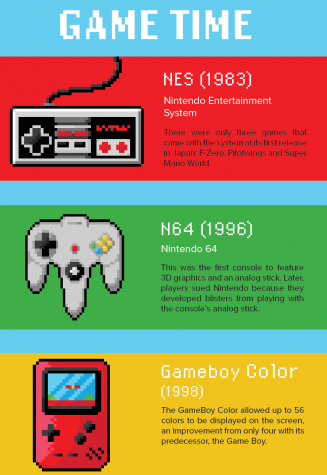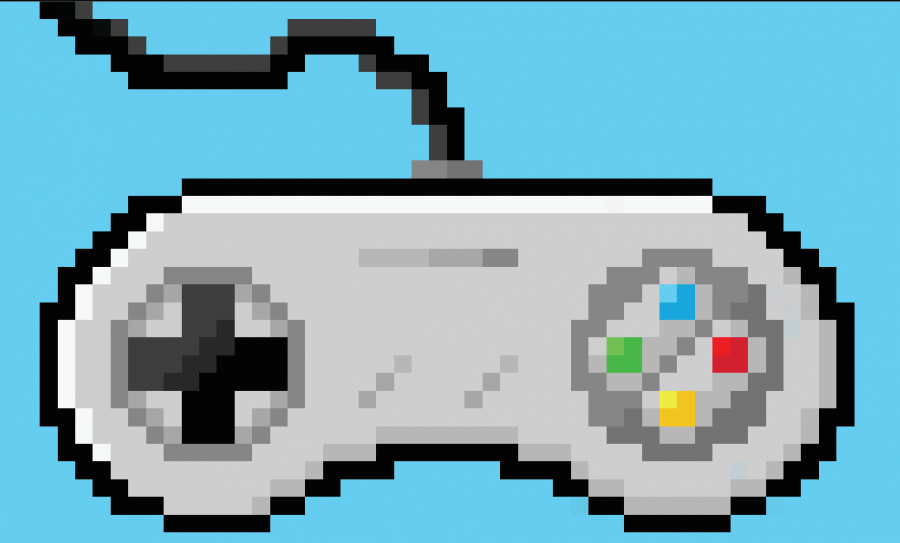The MVHS community reflects on their experiences with console gaming
Exploring how gaming has impacted MVHS community members’ lives
December 8, 2021
When science teacher Kyle Jones was in college, he and his roommates were completely immersed in the world of console game Mario Kart 64. He recalls taking the game “to another level” — having gaming tournaments with his friends, keeping track of scores and even collecting their data in graphs. Video games, whether as consoles or online games, have always been a part of all of Jones’ life, as he’s been playing since he was 7 years old.
“I remember putting hours and hours and hours of time into the original Pokémon games on GameBoy Color on family road trips, just sitting in the car playing that over and over again,” Jones said. “[The games] allowed me to sort of be immersed into a world where I could just do something that was fun, interesting and engaging.”
To Jones, games were essential to his childhood, especially because he was at the right age for what he calls the “video game revolution.” He started playing games on the Nintendo Entertainment System, more commonly known as the NES, but ended up using the Nintendo 64 console the most. Since Jones was in middle school, he says he had both free time and not too much responsibility.
Along with a few other older gaming systems, senior Shalini Krish also owns the Nintendo 64 — although it only works if you “hit it.” To her, this gaming system is associated with the older generation of gaming. Many of the games she’s played that she believes are “notable” are ones that stemmed from the older gaming systems rather than the new ones she uses today.
One of Krish’s favorite games is Breath of the Wild, an open-world console game where players are given the freedom to explore and take their own journeys. Jones has noticed that this expansive storytelling quality has arisen in games over the years, as they’ve improved their graphics, become longer and more complex and now, more immersive and engaging. Part of this complexity and challenge adds to what Jones believes is one of the benefits of gaming, especially for people who may be more introverted.
“The thing about video games is that it provides you with a challenge in a relatively safe environment,” Jones said. “Certain things can provide you with a challenge in real life, but there [could be] a lot of anxiety around them. But in video games … you can practice with yourself and it feels a little bit less intense. You’re not going to be publicly embarrassed if you make a mistake, right? Your peers are not crowding around you like if you’re playing soccer [or] something [where] everyone’s watching you.”
While Principles of Engineering teacher Ted Shinta believes that games are good for recreation, he warns people against getting too attached. He was first introduced to gaming in college through arcades, where he enjoyed frequent games of pinball with his friends. After, when video console games first released, not only was he unable to afford consoles such as the NES, he simply wasn’t very impressed, believing the console to be “pixelated” and “not very good.” It was the Super Nintendo Entertainment System, or the SNES, which came out in 1990, that finally got him into console gaming and specifically role-playing games.

However, at one point, Shinta found himself on the final level of a Final Fantasy game unable to beat the boss. After spending countless hours and days maxing out his character’s strengths, his frustration led him to look on a website which had tips and tricks for the Final Fantasy game, a website he initially refused to look on because he thought “it [was] like cheating.” Once on the website, he discovered the reason for his inability to beat the level — the experience soured games in his mind.
“I found out that there was something in the middle of the game that you were supposed to find under a rock, and I didn’t find it [but] I had everything else except that one thing,” Shinta said. “If I want[ed] to go back to that point, I’d have to start from that point and then I’d have to fight my way back through the game. So then I got disgusted with games and I realized, I’m working and I’m wasting all this time playing games, I could just work another job, for all the time I spent playing video games.”
Despite his beliefs about the benefits, Jones also believes he “probably spent too much time playing games” in high school and in college, missing out on opportunities when getting absorbed in video games.
“It was almost an easy way to get out of having to do things that would have been more beneficial for my growth,” Jones said. “Instead of putting myself out there in social situations, I just defaulted into playing games. If I could go back, I would make sure that I had a more balanced approach to gaming in the sense that I would not use it as a crutch where I had some social anxiety.”
However, Krish sees benefits to gaming that go beyond simple enjoyment and hopes that it can be integrated into other fields, such as computer science, which she plans to pursue. Ultimately, she encourages others to explore gaming.
“I feel like gaming is a really big part of culture,” Krish said. “It’s an entire community, right? You have people from different games bonding over the same thing. It’s definitely helped me in things that I do today, even in academics. I see some aspects of gaming in the work that I do. I do see a lot of potential for gaming, and I feel like it shouldn’t be something that’s limited to nerds or geeks or something but should be just a general shared experience.”


















